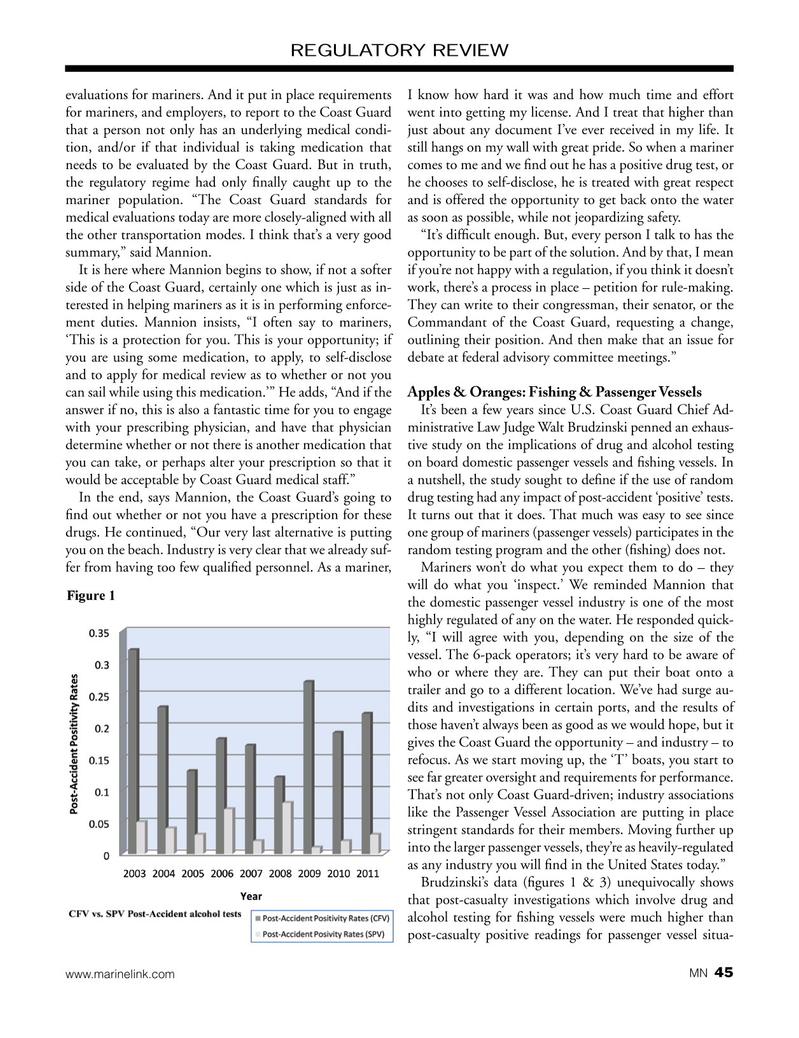
Page 45: of Marine News Magazine (March 2019)
Pushboats, Tugs & Assist Vessels
Read this page in Pdf, Flash or Html5 edition of March 2019 Marine News Magazine
REGULATORY REVIEW evaluations for mariners. And it put in place requirements I know how hard it was and how much time and effort for mariners, and employers, to report to the Coast Guard went into getting my license. And I treat that higher than that a person not only has an underlying medical condi- just about any document I’ve ever received in my life. It tion, and/or if that individual is taking medication that still hangs on my wall with great pride. So when a mariner needs to be evaluated by the Coast Guard. But in truth, comes to me and we fnd out he has a positive drug test, or the regulatory regime had only fnally caught up to the he chooses to self-disclose, he is treated with great respect mariner population. “The Coast Guard standards for and is offered the opportunity to get back onto the water medical evaluations today are more closely-aligned with all as soon as possible, while not jeopardizing safety. the other transportation modes. I think that’s a very good “It’s diffcult enough. But, every person I talk to has the summary,” said Mannion. opportunity to be part of the solution. And by that, I mean
It is here where Mannion begins to show, if not a softer if you’re not happy with a regulation, if you think it doesn’t side of the Coast Guard, certainly one which is just as in- work, there’s a process in place – petition for rule-making. terested in helping mariners as it is in performing enforce- They can write to their congressman, their senator, or the ment duties. Mannion insists, “I often say to mariners, Commandant of the Coast Guard, requesting a change, ‘This is a protection for you. This is your opportunity; if outlining their position. And then make that an issue for you are using some medication, to apply, to self-disclose debate at federal advisory committee meetings.” and to apply for medical review as to whether or not you can sail while using this medication.’” He adds, “And if the Apples & Oranges: Fishing & Passenger Vessels answer if no, this is also a fantastic time for you to engage It’s been a few years since U.S. Coast Guard Chief Ad- with your prescribing physician, and have that physician ministrative Law Judge Walt Brudzinski penned an exhaus- determine whether or not there is another medication that tive study on the implications of drug and alcohol testing you can take, or perhaps alter your prescription so that it on board domestic passenger vessels and fshing vessels. In would be acceptable by Coast Guard medical staff.” a nutshell, the study sought to defne if the use of random
In the end, says Mannion, the Coast Guard’s going to drug testing had any impact of post-accident ‘positive’ tests. fnd out whether or not you have a prescription for these It turns out that it does. That much was easy to see since drugs. He continued, “Our very last alternative is putting one group of mariners (passenger vessels) participates in the you on the beach. Industry is very clear that we already suf- random testing program and the other (fshing) does not.
fer from having too few qualifed personnel. As a mariner, Mariners won’t do what you expect them to do – they will do what you ‘inspect.’ We reminded Mannion that the domestic passenger vessel industry is one of the most highly regulated of any on the water. He responded quick- ly, “I will agree with you, depending on the size of the vessel. The 6-pack operators; it’s very hard to be aware of who or where they are. They can put their boat onto a trailer and go to a different location. We’ve had surge au- dits and investigations in certain ports, and the results of those haven’t always been as good as we would hope, but it gives the Coast Guard the opportunity – and industry – to refocus. As we start moving up, the ‘T’ boats, you start to see far greater oversight and requirements for performance.
That’s not only Coast Guard-driven; industry associations like the Passenger Vessel Association are putting in place stringent standards for their members. Moving further up into the larger passenger vessels, they’re as heavily-regulated as any industry you will fnd in the United States today.”
Brudzinski’s data (fgures 1 & 3) unequivocally shows that post-casualty investigations which involve drug and alcohol testing for fshing vessels were much higher than post-casualty positive readings for passenger vessel situa- 45 www.marinelink.com MN

 44
44

 46
46
